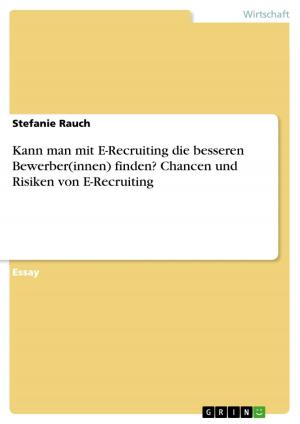| Author: | Philipp Studt | ISBN: | 9783638487344 |
| Publisher: | GRIN Verlag | Publication: | April 8, 2006 |
| Imprint: | GRIN Verlag | Language: | English |
| Author: | Philipp Studt |
| ISBN: | 9783638487344 |
| Publisher: | GRIN Verlag |
| Publication: | April 8, 2006 |
| Imprint: | GRIN Verlag |
| Language: | English |
Research Paper (postgraduate) from the year 2004 in the subject History Europe - Germany - National Socialism, World War II, grade: B, Boston University, course: Readings and Research, 11 entries in the bibliography, language: English, abstract: Richard Sorge repeated his last words three times and, according to the Tokko's official witness to the execution, spoke clearly and with conviction, lacking any show-off in his manner. He then snapped to attention, his executioners recognized the sure moment, and the trap was sprung. Throughout history, intelligence about adversaries has affected the outcome of conflicts. Leaders' decisions are, amongst many other factors, at least affected by, and more often dependent on, the information that they have access to. In this paper, it will be investigated under which circumstances and to what extent spy activity affected the outcome of Russia's defense against the German invasion during World War Two. Situations will be explored when Stalin was provided with excellent and precise information but did not use it, investigating what caused him to ignore it. Equally, the battle of Moscow will be looked at more closely to show how immensely valuable spies can be if actually listened to. This essay will focus on Dr. Richard Sorge and the members of his Tokyo Spy Ring, arguably one of the most effective groups of the Second World War, second only to Werther and the Red Orchestra. Sorge's spy ring will be assessed in detail, aimed both to show how they were able to build up and conduct their operations in the face of considerable counterintelligence, investigating the most important members' backgrounds to help understand their motives and convictions and finally determining what factors contributed to their identification and arrest.
Research Paper (postgraduate) from the year 2004 in the subject History Europe - Germany - National Socialism, World War II, grade: B, Boston University, course: Readings and Research, 11 entries in the bibliography, language: English, abstract: Richard Sorge repeated his last words three times and, according to the Tokko's official witness to the execution, spoke clearly and with conviction, lacking any show-off in his manner. He then snapped to attention, his executioners recognized the sure moment, and the trap was sprung. Throughout history, intelligence about adversaries has affected the outcome of conflicts. Leaders' decisions are, amongst many other factors, at least affected by, and more often dependent on, the information that they have access to. In this paper, it will be investigated under which circumstances and to what extent spy activity affected the outcome of Russia's defense against the German invasion during World War Two. Situations will be explored when Stalin was provided with excellent and precise information but did not use it, investigating what caused him to ignore it. Equally, the battle of Moscow will be looked at more closely to show how immensely valuable spies can be if actually listened to. This essay will focus on Dr. Richard Sorge and the members of his Tokyo Spy Ring, arguably one of the most effective groups of the Second World War, second only to Werther and the Red Orchestra. Sorge's spy ring will be assessed in detail, aimed both to show how they were able to build up and conduct their operations in the face of considerable counterintelligence, investigating the most important members' backgrounds to help understand their motives and convictions and finally determining what factors contributed to their identification and arrest.















